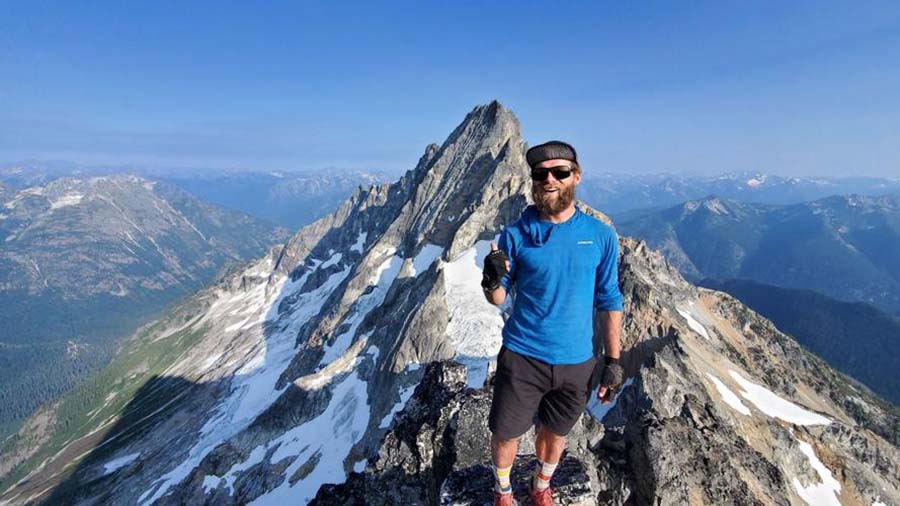Succeeding against the odds: She earned her degree at SOU while homeless; he recovered from serious injuries to climb his way into mountaineering record books
By Dennis Powers for Ashland.news
I asked friends what they thought stood out as being courageous by Southern Oregonians. Courage defined as “the ability to do something that frightens” or “strength in the face of pain or grief.” Some brought up friends who fought in Vietnam, Iraq, Kuwait and Afghanistan. True enough. Others mentioned family members who fought cancer or Afib. Again, true enough. There are police, fire, Secret Service, undercover detectives and more.
I remembered an older woman at a local drive-thru, who had a scarred face and seemed to have beaten a meth addiction. She was always smiling and seemingly good-natured. When particularly helpful (i.e., extra sauce packets or conversation), I would hand her a dollar with my thanks, which I did when someone seemed to appreciate my being there. Her face responded with “Thanks,” but I was the one who felt thankful due to her graciousness — not bitterness — and attitude. And that she had beaten drug addiction. I’d give more if I could get away with it.
Then, there was the nonprofit volunteer on a local NGO’s board of directors, who I knew had lost all of his retirement money to high medical bills for a loved one. But for years he continued his volunteer work in making the community better, working alongside others who were so comfortable financially — but never indicating insecurity or that in off-hours he worked off his rent in a side-deal with the owner.
Living in a tent
Of others that come to mind, I remembered the recent story of a homeless woman who completed her degree requirements to graduate from Southern Oregon University. At the time, Heather Yandell was living in a tent off the Bear Creek Greenway while attending SOU and, prior to that, Rogue Community College.
She and her husband, Chris, washed their clothes in Bear Creek; she even dyed her hair so classmates wouldn’t know she didn’t have any consistent access to shower facilities. Heather graduated with a bachelor’s degree in emerging media and digital arts in June 2023. The chair of her department didn’t know she was homeless until her final project. She then earned a housing scholarship and enrolled in SOU’s MBA program. Being able then to store meats and frozen food — and take a bath when she wanted — things that others took for granted, stood out for her.
In an interview with Ashland.news reporter Holly Dillemuth at her campsite, Yandell said she became homeless around 2015-16, after suffering a fall on ice that injured her back and then being laid off. She spent several years living in a car, a shelter, friend’s home or a tent.
‘We deserve better’
And why was she so motivated to get a degree? “We deserve better than spending the rest of our lives in a tent,” Yandell answered. “The thought of dying on the street terrifies me, and so I am doing everything in my power to make sure that doesn’t happen.”
A second story is that of Jason Hardrath. Now in his mid-30s, he was an athlete for most of his life. He began running in middle school after his parents told him skateboarding was too dangerous. Hardrath became the fastest miler in high school in his hometown of Baker City, Oregon. From there, he ran cross-country and track for Corban University in Salem, graduating in 2011 with a degree in kinesiology and physical education.

To celebrate his graduation, he rode his bicycle across the country from the Pacific Ocean to the Atlantic, taking 50 days to do so. Soon afterward, he got into marathoning and Ironman triathlons. Hardrath moved to the Klamath Falls area in 2012, and the Bonanza Schools hired him to teach PE and health to elementary school children.
Endurance sports as an outlet
Overcoming adversity is the name of his life, beginning with his attention-deficit/hyperactivity disorder. He’s used running, triathlons and other endurance sports as outlets. As he explained, “As I kid, I couldn’t sit still. I found athletics was where I could be successful.”

In 2013, he devoted his training to Ironman contests to become more competitive. Ironman competitors cover 140 miles in an event by swimming, biking and running. In 2014, Hardrath qualified for the world championships in Calgary, Canada as well as for the 2015 world championships.
Devastating crash
Then a terrible crash changed everything. In the spring of 2015, Hardrath was coaching and teaching in addition to his own Ironman training. He’d wake up at 4 a.m., swim, bike to work, teach, coach and then bike back home. On May 8 that year, he had several meetings to attend. But driving too fast around a curve, his car caught the road’s shoulder, flipped, and threw him through an open window. He was hospitalized with nine broken ribs, a broken right shoulder, a collapsed lung, internal organ contusions and two torn knee ligaments.
His doctors concluded that his athletic life was finished, but Hardrath optimistically completed long, painful physical therapy. As it was easier to walk uphill than to run — because he couldn’t extend his knee — he focused on climbing mountain peaks. Over a period of six months, he climbed some of the “smaller” peaks in the Cascades, such as McLoughlin and Thielsen. In early November, he summited Mount Shasta, at 14,180 feet (a total of 25-plus times now). And off he went.
Hardrath needed to learn technical mountaineering and rock climbing skills and, during the summers, headed to Utah slot canyons, Northern California’s Castle Crags, and to numerous mountains in the Sierra Nevada, increasingly focused on complex, technical routes. Working painfully back into shape, he set an FKT (fastest known time) in 2021 by climbing Washington’s 100 highest peaks, known as the Bulger List, in 51 days during his summer vacation.
Since no one had climbed Washington’s 100 tallest peaks in a single season before, Jason had a logistical nightmare. Between finding and memorizing climbing routes, creating peak linkups, making a nutrition plan and support crew strategy, it took six months just to put the logistics together.
Fast track to success
The fastest anyone had completed the Bulger List was 410 days. Hardrath’s smashing of that record became the subject of a documentary, “Journey to 100.” He moved on to scaling California’s 15 peaks of more than 14,000 feet in less than a week, and then, in 2023, began planning the “Rocky Mountain Slam.”
But another major obstacle arose early that May. Racing his mountain bike down a dirt road on Mount Shasta, Hardrath collided with a deer that darted in front of him. While hospitalized again with serious injuries, he learned that he also had COVID-19.
With grit, Hardrath kept going. In just under 40 days in the summer of 2023, he summited 122 Rocky Mountain peaks, all above 12,000 feet, in Colorado, Wyoming and Montana, a challenge known as the Rocky Mountain Slam.
Despite badly blistered feet and lingering COVID effects, Hardrath smashed the previous record of 60 days. He needed to average three peaks a day. He completed total elevation gains of 319,000 feet, and he hiked/climbed/ran nearly 700 miles. Hardrath suffered from elevation sickness and his supply truck broke down along the way, but he did it. And see his website.
Sources: Holly Dillemuth, Ashland.news, “Heather Yandell had an eventful June…,” July 21, 2023, at its website; interviews with residents.
Jason Hardrath: Lee Juillerat, “Making the Impossible Possible,” Southern Oregon Magazine, Jan. 10, 2023; his website at jasonhardrath.com; Dennis Powers, “Jason Hardrath: Overcoming Adversity,” Bicoastal Media: KMED, Past and Present, Feb. 8, 2024.
Retired Southern Oregon University business law professor Dennis Powers, a historian and author of 25 books, has lived in Ashland for some 30 years. Email him at [email protected]


















![United States’ cities average electricity price per kWh. U.S. Bureau of Labor Statistics, APU000072610], retrieved from FRED, Federal Reserve Bank of St. Louis; https://fred.stlouisfed.org/series/APU000072610, Nov. 10, 2025.](https://ashland.news/wp-content/uploads/2025/11/Power-graphic.jpg)


